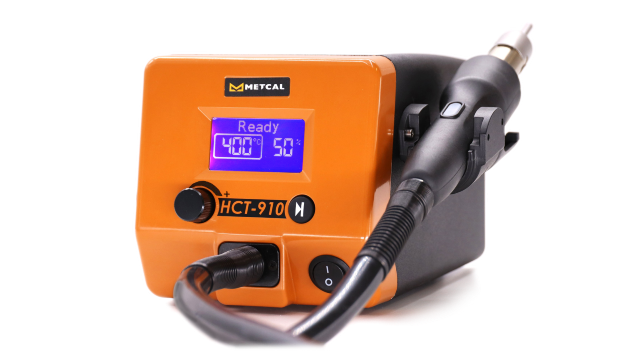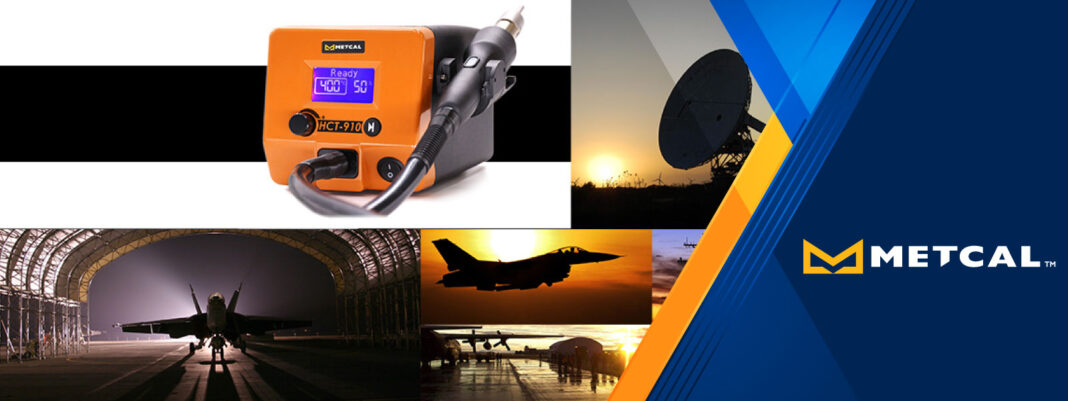Rework Solutions for Heavy-Duty PCB in Contract Manufacturing
TestEquity is an approved distributor for Metcal.
Content Source: https://www.metcal.com/hand-soldering/rework-solutions-for-heavy-duty-pcb-in-contract-manufacturing/
Contract manufacturers rely heavily on the technical expertise of desoldering and rework equipment suppliers to help solve difficult manufacturing challenges, such as reworking highly metalized circuit boards in military and defense equipment manufacturing. An effective supplier is an integral member of the contact manufacturing team, with technical expertise and industry know-how about manufacturing processes, materials, and equipment.
This partnership is especially important for manufacturers of sophisticated electronics like those used in the military, defense, and aerospace industries. These systems must meet the highest performance and reliability standards, but are costly, time-consuming to manufacture, and must adhere to strict industry regulations.
Complexities in Military, Defense & Aerospace Manufacturing
To illustrate the complexities of these manufacturing challenges, consider the lifespan and purpose of a satellite. Satellites are manufactured to the highest quality standards because they need to remain operational miles above the earth for many years. Like many military and defense systems, satellites utilize high RF (radio frequency) electronics. In satellites, electronics are used to monitor weather, provide navigation and communication services, and perform military surveillance.
Upstream, mission-critical computers perform important calculations that control the flight plan when a satellite is launched into space. Downstream, a multitude of electronic devices collect, store, and process data and images from satellites. And all of these systems must work cooperatively and reliably.
The Thermal Management Dilemma
Thermal management is one of the biggest challenges when designing and manufacturing high RF devices for military, defense, and aerospace applications. These devices produce a lot of heat, yet many high-performance components within these systems are heat sensitive. Component failures increase exponentially with every degree of increased temperature. For example, a temperature increase of as little as 10°C can double the risk of component failure.
Heat Dissipation Techniques
To manage heat, large metallic heat spreaders and thick multi-layer metallic ground planes are incorporated into the PCB design. Copper and aluminum, both excellent electrical and thermal conductors, are commonly employed to draw heat away from sensitive components.
Heat sinks and thermally conductive adhesives further assist with heat dissipation. These techniques effectively draw heat away from components, extending the lifespan of the system. However, these heat dissipation strategies significantly complicate PCB assembly processes like hand soldering and desoldering/rework.
The Challenge of Hand Soldering and Desoldering Highly Metallized PCBs
Creating a strong reliable solder joint, or desoldering that same joint, requires heat. The solder must be heated above its melting point and held there long enough for the molten solder to flow. When desoldering a PCB with thick metal ground planes, heat is drawn away from the soldering tool. This makes it difficult to maintain optimal temperature.
It can be challenging to fight the heat spreading effect when working with components on high RF boards. If the solder fails to melt and flow properly, you get a “cold” solder joint, which will crack or break easily. When reworking, if the solder does not melt, the component to be replaced cannot be removed from the board.
Here Is How Metcal Military-Grade Soldering Solutions Helped A Military And Defense Manufacturer Who Was Struggling With Rework Of Highly Metalized PCBA
A potential customer was faced with challenging rework of an ultra-thick metalized printed circuit board (PCB) substrate with thermally conductive adhesives. The heat spreading properties built into their designs, and the thermally dissipating conductive adhesives, made it difficult to remove heat-sensitive components without damaging them. They had developed an elaborate and inefficient system for rework, one that was time-consuming, dangerous, and lacked process control.
- PCBs were placed inside an oven at 120°C for 20 to 30 minutes prior to rework.
- Operators wore oven mitts to protect their hands when removing the hot boards from the oven.
- The boards were then taken to the rework bench and placed on a preheater set at 150°C.
- While desoldering, the temperature of the soldering iron was cranked up to maximum. An air heater was used to blow hot air on the assembly to maintain the temperature of the substrate.
In addition to the 20-to-30-minute bake, it took 8-12 minutes at the bench to repair each PCB. This process was repeated multiple times throughout the day, so throughput was quite low.
Not only were there other costs associated with such low operational efficiency, the disadvantages inherent in the above scenario included:
- Increased risk of damage to the PCB and components.
- Increase damage to the soldering tips due to overheating.
- Increased exposure to occupational hazards and risk of operator injury.
Why did the customer have to go to such great lengths to rework these boards? The challenge was built right into the design.
How Metcal Solutions Helped Solve the Problem
Metcal, as a leading supplier of high-quality hand soldering, desoldering, and rework equipment was contacted to evaluate the customer’s rework application and their struggles with heat-dissipating boards. Metcal was tasked with developing an effective solution that reduced risks of damage and injury and improved throughput. Metal’s team came up with these solutions that reduced rework time and improved process control:
Metcal PCT-100 Focus Preheater set at 100°C worked so effectively that the 20-to-30-minute oven bake was no longer needed. The PCT-100 targeted heat for improved speed and efficiency for high thermal demand applications. Heat volume was added without turning up the temperature, so the operators could perform rework at the appropriate temperature without distorting the circuit board.

Metcal HCT-910 Hot Air Rework System further simplified and optimized the rework process. HCT-910 900 watts of power and an “On the fly manual mode” for quickly adjusting temperature and flow rates helped with the rework efficiencies.The status light feature on the handpiece of the HCT-910 enabled operators to always see whether the unit was in heating or cooling mode. This made the unit safer to use than the customer’s previous systems. Multiple customizable temperature and airflow presets and standby/sleep timers provided the manufacturer with the ultimate in process control.
Metcal SmartHeat® fixed-temperature inductive soldering and desoldering tweezers were added to the process which took temperature control management away from the operator and into the self-regulating tips.
With patented SmartHeat®, Metcal cartridges provided fixed temperatures at the molecular level, that literally self-regulate based on the specifically developed alloy. That translated to soldering tips that never exceeded 10°C over the temperature specs, for outstanding repeatability and process control. This was the level of predictability required by the manufacturer.
The Results
These process changes reduced desoldering time to 4 to 6 minutes per PCB assembly, a 20 – 35-minute time savings per board! It was also ensured the temperature of the iron would remain within 10°C of the engineering specs.



